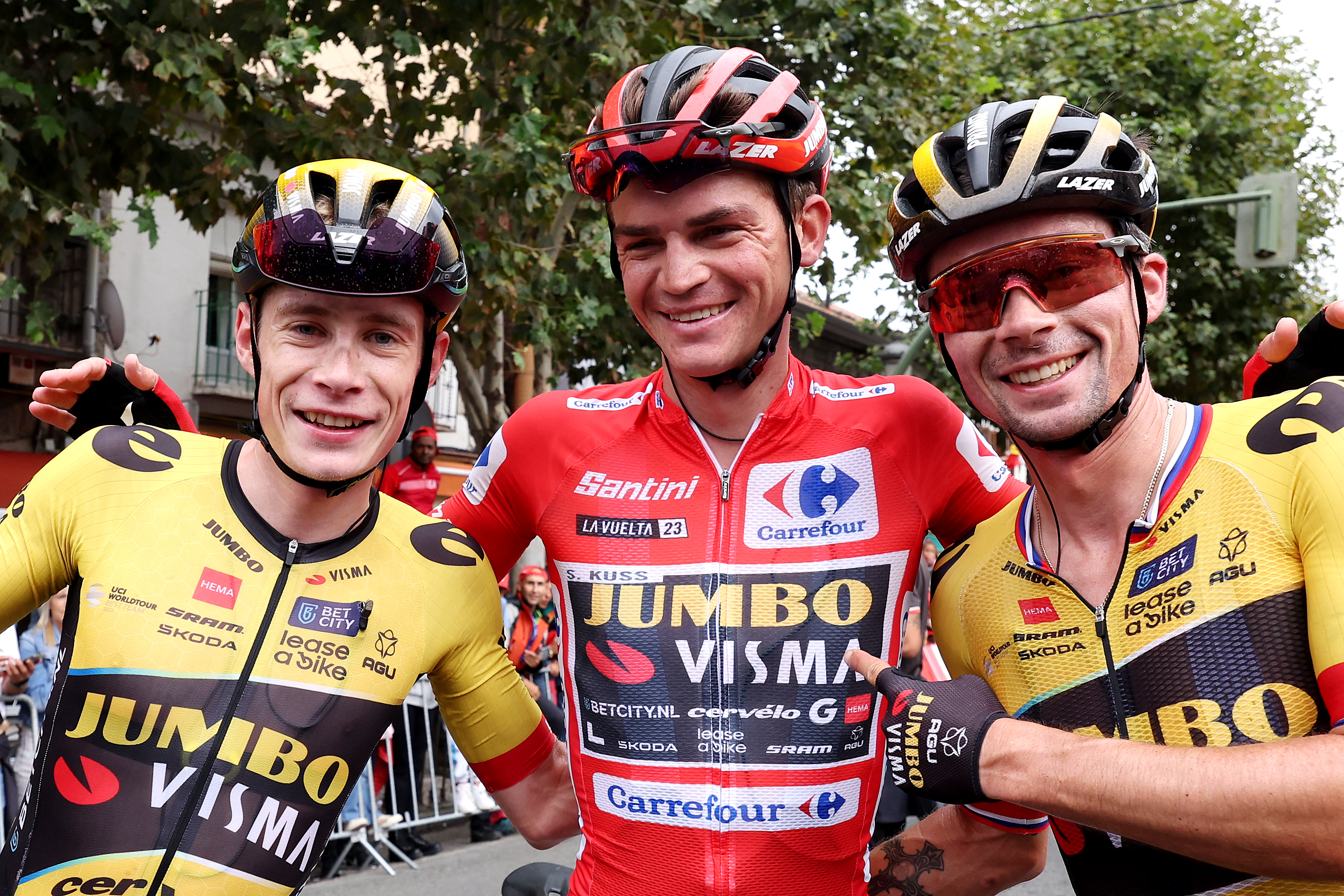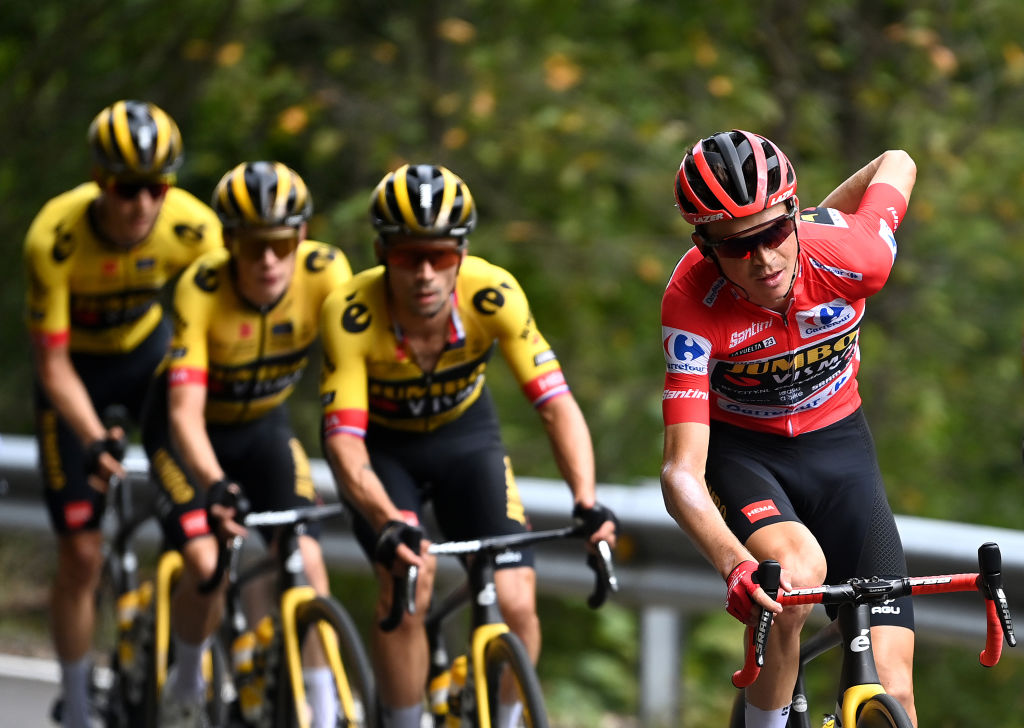Sepp Kuss: I think I deserved to win the Vuelta a España
American reveals more about the internal rivalry with Roglic and Vingegaard

Sepp Kuss has revealed further details of the internal Jumbo-Visma team leadership struggle and the decisive meetings that led to him being protected team leader and the eventual winner of the Vuelta a España.
The American rode into Madrid in triumph on Sunday, with Jonas Vingegaard and Primož Roglič celebrating him as the winner, but only after a tense final week in the mountains when both appeared keen to take his race leader’s red jersey.
Kuss gained three minutes on Vingegaard andRoglič when he was allowed to go in the break and then won stage 6 to Javalambre. He took the maillot rojo on stage 8 and kept it all the way to the final week thanks to an excellent performance in the Valladolid time trial and newfound consistency in the mountains.
Race leadership meant he was no longer obliged to sacrifice his chance for his teammates and he proved to be their match and up to the task day after day, all the way to Madrid.
“I think I deserved to win the Vuelta,” Kuss told Marca in a post-Vuelta a España interview, looking back at the tense final week.
“I know that I’m here due to a race situation but from that moment I showed that I could do a good time trial, climb with the best climbers in the world and all in my third Grand Tour of the year. I think I completely deserved this Vuelta but I also have to thank my teammates for putting themselves in my place.”
Kuss and Jumbo-Visma clearly didn’t expect to retain the race lead for so long after the Javalambre stage. He has often suffered a bad day while also being vital in Jumbo-Visma’s Grand Tour success.
Get The Leadout Newsletter
The latest race content, interviews, features, reviews and expert buying guides, direct to your inbox!
Remco Evenepoel’s collapse on stage 13 to the Col du Toutmalet helped Jumbo-Visma’s cause but also showed that Vingegaard andRoglič could also win the Vuelta, fueling the internal rivalry and initial ‘the road will decide’ leadership strategy.
“We didn't know how far I could go physically and mentally because it’s a new experience for me to be leading a race. But from the moment I became the race leader, I felt so good that I thought I wouldn't lose the jersey,” Kuss said.
Tensions after the Angliru

Kuss, Vingegaard and Roglič celebrated a historic 1-2-3 on the Vuelta podium in Madrid but the final hierarchy in the team was only decided after the tensions of the finish on the Angliru, where Roglič and Vingegaard rode away from the Kuss, despite him wearing the red leader’s jersey.
Before then Vingegaard had ridden away on the Col du Tourmalet to pull back 37 seconds on Kuss. On stage 16, Vingegaard was given the green light to attack again and pulled back a further 1:15, putting him just 29 seconds behind Kuss. On the Angliru finish, Roglič accelerated away from Kuss and Vingegaard opted to follow him rather than stay with Kuss, the two of them openly attacking their teammate and then race leader.
The tactics sparked a huge outcry and the Jumbo-Visma team management finally decided to back Kuss and oblige Vingegaard and Roglič to ride for him rather than for themselves. Roglič and Vingegaard agreed but the Slovenian openly admitted he had put aside his personal ambitions.
“After the stage it was a bit ugly on television,” Kuss admitted to Marca.
“Before we didn't know that the three of us were going to be the strongest in that race and that made things a little complicated because, normally, your teammates are not your rivals.”
Kus reveals a first key team meeting was held before stage 16 but team leadership remained up for grabs. He insists he was ‘competing’ with his former team leader rather than ‘fighting’ with them.
“We wanted to compete against our rivals but when we didn't have rivals, it became more complicated,” he admitted.
“It was a little difficult for me to say 'I want things to be like this'. In the first meeting we had to wait to see what Primoz and Jonas said and how they wanted to do the race.
“I understand Primoz's position. He had been preparing for the Vuelta for half a year. He came to race in very good shape, he had a perfect race and deserved to at least try to win. Jonas has already won two Tour de France and the Vuelta was a chance for another success and he’s a winner. I was in the middle, not as a rivalry, but in a competition.”
“From the Bejes stage, I didn't know what it all meant to people who had previously been my leaders, and what role I was going to have or what it was going to mean for the team.
“I didn't know if they were going to attack me. I had a lot of thoughts and they were not all positive but that was the first moment I thought I could lose the jersey to a teammate rather than a rival.”
Kuss' future role at Jumbo-Visma

Kuss’ future role at Jumbo-Visma has still to be discussed and decided. He has a contract until the end of 2024 but winning the Vuelta a España changes many things, including his earning potential and future role as a team leader.
“I’ve realised that I am capable of leading a Grand Tour and being very consistent on almost every stage but now I know more than ever how hard it is to be a team leader,” Kuss admitted.
“I still like my job as a domestique because I can relax and switch off during the race. After this Vuelta, I'm more exhausted mentally than physically. I still have to think about the future.”

Stephen is one of the most experienced member of the Cyclingnews team, having reported on professional cycling since 1994. He has been Head of News at Cyclingnews since 2022, before which he held the position of European editor since 2012 and previously worked for Reuters, Shift Active Media, and CyclingWeekly, among other publications.